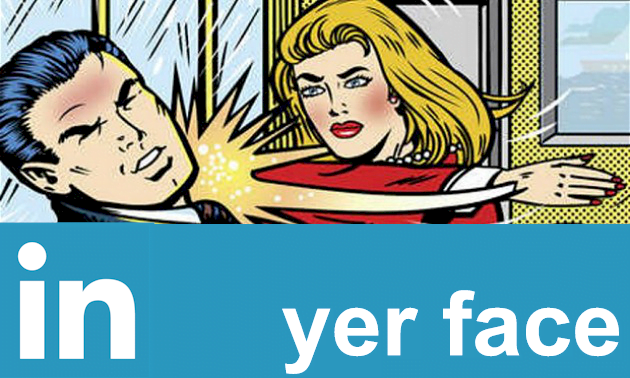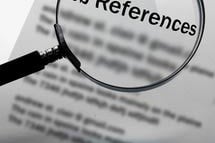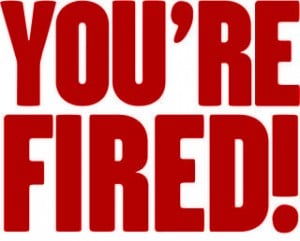In the November 11, 2014 Ask The Headhunter Newsletter, we examine yet another questionable LinkedIn “feature” that could cost you a job.
Question
The New York Times just did a story about a group of people suing LinkedIn for selling possibly invalid references to employers. Now LinkedIn has gone too far. This is causing employers to reject job applicants, and the applicants didn’t even provide the references! What do you think of this career sucker-punch?
Nick’s Reply
Here’s the bottom line: There is zero integrity in LinkedIn’s “Trusted References” sales pitch. While LinkedIn sells employers a reference checking service, it defends against the lawsuit by saying it’s not really selling a reference checking service — it’s just selling a list of names.
And LinkedIn thereby throws its own integrity into the toilet. I don’t see how any employer could even contemplate using such a “service.”  It really is a sucker-punch — LinkedIn connects an employer with wrong “references” and you can’t even defend yourself.
It really is a sucker-punch — LinkedIn connects an employer with wrong “references” and you can’t even defend yourself.
I’ve got over 500 LinkedIn connections — most of whom I’ve never met. Some may have crossed my path at a company with thousands of employees. How irresponsible is it of LinkedIn to sell those overlaps as my
“trusted references?”
What are references?
What if I’m a food critic and I write a newspaper column that tells you a restaurant is no good? You buy the paper and avoid the restaurant. Can the restaurant sue me for loss of business? Even though money changed hands for “data,” do you really think a restaurant critic could go to jail?
I think the New York Times did a poor job covering this story, because it confuses several issues and fails to clearly point to the real problem.
Before we get into that, let’s remember that references make commerce possible. They are an important part of business. People’s opinions and judgments about us — and about products, services, brands and companies — are the coin of the realm in any economy. When smart employers hire and when good headhunters recruit, we check relevant opinions and judgments first, to make sure we know who (and what) we’re dealing with. That’s why your reputation — and any company’s reputation — is so important.
It makes no sense to suggest that checking references before hiring someone is inappropriate, or that rejecting someone for a job because of poor references is wrong. It’s due diligence. The Times seems to confuse seeking and sharing opinions with privacy. I think the lawsuit does, too.
But that’s where the controversies start. The Times doesn’t address certain questions, and I’m not going to, either, because this isn’t an analysis of references. Nonetheless, I’ll bait your confusion by posting some of the questions I think need to be answered:
- What is a reference?
- Who owns references?
- How far can an employer go when checking references?
- Can you buy a reference?
- What does an employer pay for when using LinkedIn to check references?
- For that matter, what do you pay for when using LinkedIn to make contacts or to get a job?
- Are people free to ask about you and talk about you if they want?
- What if someone decides not to do business with you based on what they learn from others?
America’s employment system has become such a jumble of promises, marketing, expectations, data and databases that everyone seems incredibly confused about what’s right, wrong, possible or legal.
Disclaimer
I’m not a lawyer, so this is not a legal opinion or legal advice. I’m a headhunter and my comments are based on (I hope) my business sense. What others say about your professional reputation matters a lot, and it does — and should — influence whether someone wants to hire you. But, what if a fencepost is checking your references?
Reference checking requires integrity
Headhunters — like homeowners looking to hire plumbers — check opinions and judgments all the time. We’ll make discreet inquiries to find out who you are, how good you are at your work, and what you’re like to work with. If we hear something out of the ordinary — positive or negative — we must have the good sense to double- and triple-check the information before we risk our own reputations by referring you to our clients. Like good restaurant critics, we realize that opinions we gather will have consequences.
Tru st and integrity are the hallmarks of our business — which is why I say about 95% of headhunters aren’t worth spit. Too many are in the business for a quick buck, and their own judgment stinks (to say nothing of their skills). It’s up to you — the consumer — to use your head before you rely on a headhunter, whether you’re a job seeker or an employer.
st and integrity are the hallmarks of our business — which is why I say about 95% of headhunters aren’t worth spit. Too many are in the business for a quick buck, and their own judgment stinks (to say nothing of their skills). It’s up to you — the consumer — to use your head before you rely on a headhunter, whether you’re a job seeker or an employer.
Likewise, it’s up to employers to judge what LinkedIn is selling them when it delivers lists of references. And it’s up to employers to ensure that their own in-house recruiters know how to select, check and evaluate references properly. In my opinion, 95% of in-house recruiters can’t be trusted with the task, and no one is the wiser. Worse, many employers outsource reference checking and have no idea whether the results are valid or reliable.
(See Automated Reference Checks: You should be very worried.)
My point is, you have no idea where your references will come from or who is checking them — any more than a restaurant does. So be careful.
What did LinkedIn do?
According to the lawsuit in the U.S. District Court of the Northern District of California:
“LinkedIn has created a marketplace in consumer employment information, where it sells employment information, that may or may not be accurate, and that it has obtained in part from unwitting members, and without complying with the FCRA [Fair Credit Reporting Act].”
The problem, plaintiffs say, is that:
“any potential employer can anonymously dig into the employment history of any LinkedIn member, and make hiring and firing decisions based upon the information they gather, without the knowledge of the member, and without any safeguards in place as to the accuracy of the information that the potential employer has obtained.”
In other words, plaintiffs claim LinkedIn is selling information that leads employers to inappropriately rejecting people for jobs. They also suggest that there may be some violation of privacy. I asked employment lawyer Mark P. Carey about the privacy issue. He says:
“Everyone who maintains a LinkedIn account should expect that their information is public.That’s why we have these personal/professional marketing pieces. There is no privacy issue as far as I can see, especially if you signed the user agreement before gaining access to host your own page.”
But I do think LinkedIn has a problem. First, LinkedIn takes money for what it advertises as “Trusted References for Job Candidates.” In so many words, LinkedIn suggests the references an employer pays to access about you are accurate — “Trusted.” That’s where I think LinkedIn crosses the line, whether legally or with regard to its own integrity. LinkedIn cannot possibly know whether those references are trustworthy. So how can it pitch them with impunity to employers — or defend them to job seekers?
When people are rejected for jobs because of questionable references, we’ve all got a problem. LinkedIn especially.
Elsewhere in its Help section, LinkedIn says:
“A reference search locates people in your network who can provide reliable feedback about a job candidate or business prospect.”
That is, LinkedIn represents that an employer can rely on the references to justify hiring you or rejecting you. In fact, it uses those words to lure employers into buying those lists.
However, LinkedIn spokesman Joseph Roualdes tries to alter LinkedIn’s own representations when he tells the Times, “A [paid] reference search… simply lets a searcher locate people in their network who have worked at the same company during the same time period as a member they would like to learn more about.”
Suddenly, LinkedIn isn’t selling anymore. It’s covering its ass. The truth is on the web site: LinkedIn promises that the references employers are buying are “Trusted” and “reliable.”
References or just a list of names?
Here’s where I think the going gets dicey for the plaintiffs. Regardless of what LinkedIn sells and promotes — references — LinkedIn does not seem to really deliver references. It apparently delivers only a list of names. It’s up to the employer to talk to those people and ask them for references.
It seems to me that if the plaintiffs were rejected by employers due to bad references, the plaintiffs should be suing the references themselves for defamation — or the employers.
 Lawyer Carey fleshes out the defamation issue for us:
Lawyer Carey fleshes out the defamation issue for us:
“The real underlying issue here is whether and to what extent an act of defamation occurred… There is no legal claim there for anything, not even defamation. The article and the lawsuit dance across the fringe of privacy and defamation, without any substance. Only when a search adds content that provides a qualification uniquely driven at the particular candidate, then someone crosses the legal line of what is neutral and what is defamatory.”
But it doesn’t seem LinkedIn is “adding content.” That is, it doesn’t deliver the text of a reference, so there’s no defamatory statement.
Perhaps the employers who paid for those names have an action they can bring if the names yield inaccurate references when LinkedIn promises otherwise — but I don’t see how a job seeker could sue LinkedIn successfully because it sold names. That seems to be covered in the company’s terms and conditions.
The Times compares this suit to one against Spokeo, an online data broker which “agreed to pay $800,000 to settle accusations” that it marketed reports to recruiters and background screeners without providing consumers with protections afforded by the law.”
But LinkedIn doesn’t seem to sell reference reports about anyone. Again, I don’t see how LinkedIn can be liable for a bad reference. The data that employers rely on to make decisions did not come from LinkedIn; only names came from LinkedIn.
LinkedIn’s Customer: Fencepost, Inc.
The larger problem is that mindless employers believe ridiculous advertisements by LinkedIn that claim a list of names are “Trusted References… who can provide reliable feedback about a job candidate.”
(Remember, we’re talking about the same “professional networking” company that charges employers for lists of the best job candidates — while it sells high rankings on those lists to job applicants! We’re talking about the same employers that know this yet still pay LinkedIn to find job candidates! See LinkedIn Payola: Selling out employers and job hunters.)
 Says the Times: “Sophisticated recruiters would not waste their time contacting people who clearly had no connection of significance to a job candidate.”
Says the Times: “Sophisticated recruiters would not waste their time contacting people who clearly had no connection of significance to a job candidate.”
But they do, and if the New York Times is going to skate over this key fact, then it’s drawing the wrong conclusions, because most HR recruiters are fenceposts. Just ask any job seeker that deals with them. (See Why do recruiters suck so bad?)
Those same recruiters stupidly waste their time interviewing candidates simply because LinkedIn represents that the “profiles” it sells are “accurate.” Is it any surprise that recruiters are suckered into making hiring decisions based on “references” that may not be accurate?
A law professor cited in the article concludes, “A company can now decide which people associated with you can be curators of your reputation in situations that matter.”
But companies have always done that. The trouble is, now there’s no need to verify that a reference is legit — that is, valid or reliable. Because LinkedIn ensures us that it is.
What’s the real problem?
LinkedIn does not sell reference reports or reference information, so I don’t think anyone can hold it liable when employers reject applicants based on comments made by a list of people LinkedIn sells.
I think the wrong plaintiffs are suing. Employers should be suing LinkedIn for its failure to take reasonable measures to ensure that the lists of references it sells are in fact “Trusted References” and that they “can provide reliable feedback about a job candidate.”
Just how stupid are recruiters who “trust” LinkedIn references? The Times reporter says the plaintiff’s lawyer showed her that recruiters have no idea what they’re buying — or whether they’re calling real references at all. The lawyer ran a “LinkedIn reference search” on the reporter:
“The search produced a list of 43 people in his network who currently work or have done work for this newspaper — including a former I.T. consultant, a freelance contributor and two former interns. I had met only four people on that reference list, and none of them had direct experience working with me.”
Just imagine: A recruiter uses LinkedIn to search his network for people who are your “Trusted References” — but the recruiter has no idea whether any of them had any direct experience working with you.
You get rejected, because someone who never worked with you provided a questionable reference. (As I pointed out, I don’t know most of my connections, thanks to LinkedIn’s marketing mission to link everyone. What if a personnel jockey gets hold of an overlapping contact and trusts it as a reference about me — and I get screwed?)
The underlying question — and concern — is, how skilled is the reference checker, and is the check done properly and with integrity?
The recruiter’s purchase of a list from LinkedIn becomes the faux justification for one potentially bad decision after another — and one unemployed LinkedIn user after another.
Have you been sucker-punched by wrong references?
LinkedIn’s “Trusted References” service is a cheap sucker-punch straight to your career and reputation. Now any personnel jockey can “check a reference” on LinkedIn without having the faintest idea what she’s doing — and you get screwed out of a job. For that reason alone, I hope LinkedIn gets its ass sued sixteen ways from Sunday. I’m not sure this suit will succeed, because I think it focuses on the wrong issues. But the legal issues are for the lawyers and the courts.
The business issue is, LinkedIn is talking out of two sides of its mouth. It markets a references service to employers, while telling the judge it’s really no such thing. And employers buy both stories.
Perhaps more to the point, since it’s consumers suing LinkedIn, those consumers need to admit that they bought into a marketing machine that uses their personal information to make money at their expense — and they agreed to the terms. When someone walks straight into a sucker-punch, it’s hard to sympathize with them.
Lots of questions remain. Whatever happens with this suit — or others that I hope it spawns — the thing that’s clear is LinkedIn’s marketing strategy: There’s a sucker born every minute, and we’re going to sell them all anything they’re willing to swallow.
Has LinkedIn’s reference service interfered with your job search, or cost you a job? How does LinkedIn’s credibility rate with you?
: :




